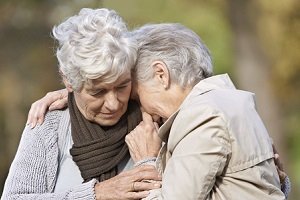Depression and Older Adults: What It Is and How To Get Help
Tweet
Sadness is a universal emotion that no one is immune from, everyone in the world feels sad in some way or another on a daily basis for various reasons. The state of feeling sad is called depression and usually refers to a condition of feeling sad very often, for a prolonged period of time.
On this page:
- Misconception among depression in elderly
- Symptoms and sign of depression in elderly
- Causes of depression in elderly
- Treatment of depression in elderly
Misconception among depression in elderly
Some people have the mistaken idea that it is normal for the elderly to feel depressed. On the contrary, most older people feel satisfied with their lives. Sometimes, though, when depression develops, it may be dismissed as a normal part of aging. Depression in the elderly, undiagnosed and untreated, causes needless suffering for the family and for the individual who could otherwise live a fruitful life.
Depression in the elderly is a widespread problem that is often not diagnosed and frequently undertreated. Many older individuals will not admit to signs and symptoms of depression for fear of being seen as weak or crazy. Depression in its many forms affects more than 6.5 million of the 35 million Americans who are 65 years or older.
Depression in older persons is closely associated with dependency and disability and causes great suffering for the individual and the family.
What are Symptoms and Signs of Depression in the Elderly?
As we age, it is normal to experience sadness when facing the changes in our capabilities, or sorrow at the loss of loved ones. However, we also continue to feel happiness, joy, contentment, and other positive emotions. Because some of these symptoms are similar to those caused by other conditions, including dementia, it is important to see a geriatric specialist for an evaluation.
Symptoms of depression in the elderly may include:
- loss of interest in normally pleasurable activities
- persistent, vague or unexplained somatic complaints
- memory complaints
- change in weight
- sleeping disorder
- irritability or demanding behavior
- lack of attention to personal care
- difficulty with concentration
- social withdrawal
- change in appetite
- confusion, delusions or hallucinations
- feeling of worthlessness or hopelessness
- thought about suicide
What are the causes of depression in elderly?
Although there is no single, definitive answer to the question of cause, many factors--psychological, biological, environmental and genetic--likely contribute to the development of depression :
- Inherited tendencies toward depression
- For some older people, particularly those with lifelong histories of depression, the development of a disabling illness, loss of a spouse or a friend, retirement, moving out of the family home or some other stressful event may bring about the onset of a depressive episode,
- Difficulty adapting to changing circumstances such as moving from a home to a retirement facility, or changes within the family
- Side effects of medications (such as medication to treat hypertension),
- Co-occurring illness (such as cancer, diabetes or stroke),
- Vascular changes in the brain.
What are the treatments available for depression in elderly?
Once diagnosed, 80 percent of clinically depressed individuals, including older persons, can be effectively treated by medication, psychotherapy, electroconvulsive therapy (ECT) or any combination of the three.
Recent research suggests that brief psychotherapy (talk therapies that help a person in day-to-day relationships or in learning to counter the distorted negative thinking that commonly accompanies depression) is effective in reducing symptoms in short-term depression in older persons who are medically ill. Psychotherapy is also useful in older patients who cannot or will not take medication. Efficacy studies show that late-life depression can be treated with psychotherapy.
For those that have had two or three episodes during their lifetime, treatment should extend up to two years after remission. And for those with more than three recurrences of depression, treatment may be life-long. The treatment that gets someone well is the treatment that will keep that person well. Find more on treatment of depression in elderly.
Why is depression in older adults hard to recognize?
It can be hard to tell the difference between depression and illnesses such as dementia. Also, older adults may not talk to their doctor about their sad or anxious feelings because they are embarrassed. But depression is nothing to be embarrassed about. It is not a personal weakness. It's a medical illness that can be treated.

I am a Hypnotherapist & I just started on
a case with a woman in her 60's. She is very
depressed, & has been to Psych. & Psychologist. And now she has come to me for
help. She has been depressed over a year.
She is worried about losing him (to death.)
We live in an active adult community. And I
wonder if she hears about some of the older
residents dying, & is freightened for her& her husband's future. I am investigating.
Rachel Kitchens (3/28/2006)

Sometimes crying or laughing
are the only options left,
and laughing feels better right now.

Current Issue
 Self Help Leaflets Take the help of our self help leaflets or booklets. |
 The DG Magazine All about living with depression |
Most Read on Depression
Symptoms of Depression
Cause of Depression
Diagnosis of Depression
Facts on Depression Statistics
5 Strengths for 5 Stressors of Today
DSM4
Mini-mental state examination
Antidepressant
Psychotherapy or Talk Therapy
Herbal treatment for Depression
Natural treatment for Depression
Alternative treatment for Depression
Self Help
How to Get Rid of Depression
Electroconvulsive therapy, or ETC
Light Therapy
Cognitive Therapy
more..












